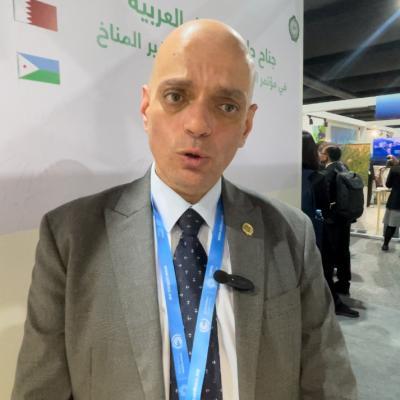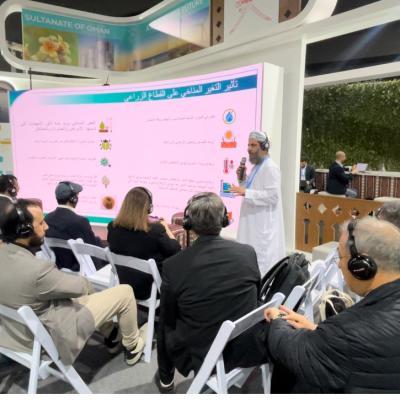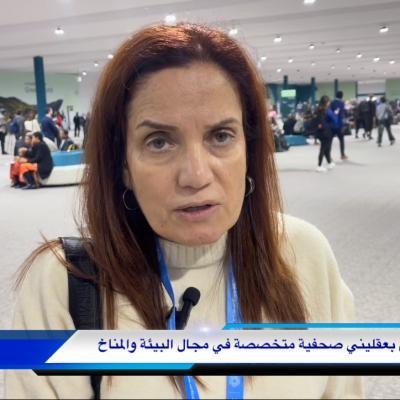(MENAFN- Palestine News Network )
Baku – Report by Munjed Jado, PNN at COP29-
As the COP29 Climate conference enters its second week, international delegations continue to assess the realities of climate change across their respective regions. Expert reports presented at the conference highlight global impacts, including a particular focus on the Arab world, which has been identified as one of the most vulnerable regions to climate change.
According to reports from United Nations organizations and international entities such as the Union for the Mediterranean, climate change is increasingly affecting the Middle East and North Africa (MENA) through rising temperatures, reduced rainfall, and worsening droughts and desertification. These changes are having a severe impact on agriculture and natural resources.
The findings indicate that climate change places significant pressure on already scarce water and agricultural resources in the region, posing threats to national security and political stability across affected countries.
Diverse Manifestations of Climate Change
During COP29, Palestine News Network (PNN) interviewed Arab officials and climate experts to better understand the forms, causes, and consequences of climate change in the Arab world. They also explored the importance of collaborative action to safeguard the future of Arab communities.
Dr. Mahmoud Fathallah, Director of the Environment and Meteorology Department at the Arab League, spoke to PNN at the Arab League Pavilion during the conference. He highlighted several factors driving accelerated climate change in the Arab region, which encompasses the Mediterranean Basin, North Africa, the Maghreb, and the Arabian Gulf.

“These areas, while not heavily industrialized, are naturally predisposed to desertification due to their arid environments. The effects are compounded by declining rainfall, water scarcity, and an expansion of desertified land,” Dr. Fathallah explained.
He added that the situation is worsened by ongoing wars and conflicts in the Arab region.“These conflicts divert resources toward militarization rather than climate protection efforts, exacerbating the climate crisis.
Key Climate Challenges in the Arab World
Dr. Fathallah also outlined the specific climate challenges facing the MENA region, including extreme temperature fluctuations, rising sea levels, shifts in rainfall patterns, and an increased frequency of severe weather events.
“The Middle East and North Africa are particularly susceptible to these effects due to their dry and semi-arid climates. The region is witnessing significant challenges, such as declining annual rainfall, rising temperatures, and soil degradation,” he noted.
Dr. Mohamed Abdel Moneim, a member of the Mediterranean Climate Change Experts Group, emphasized the compounded impact of natural and human-induced factors on the region's climate.

Wars and conflicts not only devastate communities but also heighten the burden of climate change, affecting people across the Arab world and beyond,” Dr. Abdel Moneim said.
The insights shared by experts underscore the urgency of regional and global efforts to address the profound and multifaceted impacts of climate change on the Arab world.
to broader Arab initiatives aimed at tackling climate change. He emphasized two primary strategies: mitigation and adaptation.
In terms of mitigation, Arab countries have implemented policies to minimize the effects of climate change, despite contributing only 3–4% to global carbon emissions-a figure significantly lower than the global average.
“While the Arab world is not a major emitter of carbon dioxide, the effects of climate change are disproportionately visible here,” Dr. Fathallah stated.

On adaptation, Arab countries are focusing on resilience-building efforts, such as enhancing water conservation, safeguarding agriculture, and investing in sustainable infrastructure.
These efforts highlight the urgent need for global cooperation and support as the Arab world grapples with the dual challenge of adapting to climate impacts and addressing broader geopolitical complexities that worsen the crisis.
“Wars and conflicts exacerbate the crisis, compounded by economic challenges and limited resources. This has left the region particularly vulnerable to climate impacts.”
Baaklini called for stronger collective efforts, stressing that the intersection of conflict, economic instability, and insufficient international support continues to place Arab nations at the forefront of climate vulnerability.
Hope for a Unified Approach
Despite these challenges, Arab League representatives remain hopeful. Dr. Fathallah called for increased regional collaboration, uniting financial and technical resources to develop a clear and unified Arab strategy for addressing climate change. Without such a strategy, he warned, the region's exposure to climate risks will only intensify.
Initiatives and Strategies to Tackle Climate Change
Experts and officials from across the Arab world have warned of the severe environmental challenges facing the region, stressing the urgent need for unified efforts and innovative initiatives to address the growing impacts of climate change.

The Middle East Green Initiative
Dr Al-Alawi highlighted groundbreaking regional and Arab initiatives, such as Saudi Arabia's "Middle East Green Initiative". The ambitious plan aims to plant 50 billion trees, with the kingdom itself pledging to plant 10 billion over the coming years, while other Arab nations are expected to plant the remaining 40 billion.
Broader Regional Efforts
Dr Fathallah emphasised that Arab nations are making efforts to confront climate change on multiple fronts, despite significant challenges, including political divisions and scarce resources.
Meanwhile, environmental journalist Suzanne Baakalini stressed the need for fundamental changes in lifestyles across various levels to curb emissions and mitigate the damage caused by climate change.
“There are ongoing efforts in clean energy, which are critically important," Baakalini said. "However, these initiatives are more prevalent in wealthier, oil-rich nations, creating disparities in how countries can address the effects of climate change."
Examples of Positive Models
Dr Mohamed Abdel Moneim, an international environmental expert, pointed to Jordan as a model for proactive climate adaptation. Despite grappling with water scarcity due to low rainfall and drought, the country has implemented smart strategies to manage the crisis, offering a blueprint for other nations in the region and beyond.

Challenges in Awareness and Action
Baakalini also highlighted the lack of sufficient public awareness in many Arab societies regarding climate change and its effects, exacerbating the problem.
“The lack of awareness compounds the crisis," she said. "All these factors point to the inadequacy of current Arab efforts to tackle climate change.”
Dire Projections Without Action
Experts warn that without comprehensive plans to address the various aspects of climate change, parts of the Middle East and North Africa could become uninhabitable by 2100. This stark warning underscores the urgent need for cohesive and effective strategies, as disparities in current efforts risk deepening an already critical situation.
MENAFN20112024000205011050ID1108907780